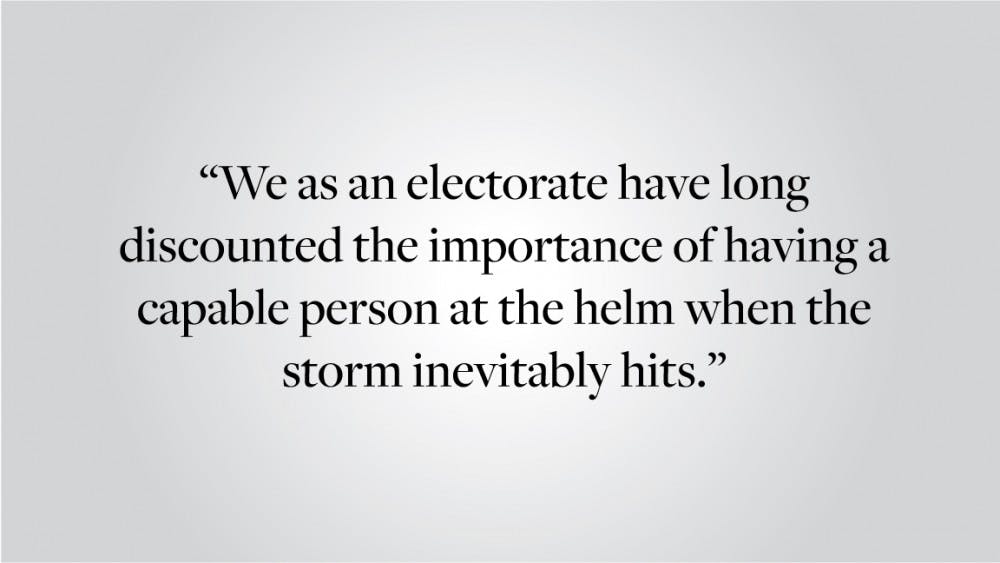If it weren’t already evident, the COVID-19 pandemic has further illuminated the greatest problem in American politics: Both sides think the other is irresponsible, both sides think the other is incompetent and both sides are right.
Otherwise unexceptional leaders step up in times of crisis. It’s a cliché as old as Cincinnatus. I just wish it were true. Unfortunately, a crisis can’t make a leader out of a fool. A crisis just makes you more of what you already are. And if there were any doubters, our government’s response to the outbreak of COVID-19 ought to have settled the question.
To be certain, there are some bright spots in the political landscape — you have governors like Andrew Cuomo and Mike DeWine who have stepped up to the plate issuing prevention guidelines and organizing among the first statewide business closures and self-quarantines in the country. And then there are people like Mayor Bill de Blasio and President Trump who have, to put it mildly, whiffed. To be certain, incompetence is bipartisan. But I can’t help but think we’ve gotten out of our politicians more or less what we’ve put in.
If you’re anything like me, you’ve spent the last couple of weeks lamenting the overt foolishness of some of our leaders. It’s justified, albeit easy, to carp at the sight of Bill de Blasio waltzing into a gym after having urged New Yorkers to stay at home. It takes no effort, beyond perhaps raising one’s voice, to gripe about Donald Trump inviting the MyPillow guy to address the nation from the Rose Garden during a national crisis.
What is more difficult is the kind of self-examination necessary — which we have too often lacked — to determine how we got here. We have gotten out of our leaders more or less what we’ve asked for: We have prioritized policy over competence, ideology over the ability to actually run the government. Americans love to lament the pettiness of our politics, but lately I’ve started to think maybe it just reflects our own.
Can you recall a time in the Democratic debates when a candidate was asked very simply, “The federal government employs more people and spends more money than any business in the world; what makes you think you can run it?” Is there a single Bernie Sanders voter out there who is motivated by a belief that he possesses certain administrative skills that make him uniquely able to run the largest organization in the world?
Nowadays, it’s all about ideology and policy. Do you support Medicare for All or not? What’s your stance on a wealth tax? It has become standard operating procedure to vote for the candidate whose political ideology most closely matches our own, to vote for a list of policy positions rather than an actual person. No doubt policy is important and deserves significant discussion, but let’s face it, no matter who is president, be it Donald Trump or Bernie Sanders, their policy proposals are unlikely to become law. Our system is built for gridlock, and, to that end, it works pretty well. Consequently, the most important role of a president or governor or any executive in the government is to run the existing apparatuses of that government. Yet, there is next to no discussion of the executive qualifications of our candidates for office.
Experience counts for very little, administrative experience even less. And to the extent it actually does matter, it’s primarily a liability. Experience is the tip of the spear amorphous politicians use to label their opponents as part of the “establishment.” And more often than not, these attacks are effective.
As a result, the executive offices of our government are frequently occupied by people who haven’t the faintest idea how to administer the responsibilities of something as large and powerful and high-stakes as the government they lead. And it’s times like these where the chickens have come home to roost. For the entire month of February, President Trump downplayed the virus and the effect it would have on American society. During that period, the federal government failed to ramp up our capacity to test people for the virus. Inaction in February meant we were caught flat-footed in March. And it’s times like now when we’re reaping what we’ve sown. Certainly, no one could have predicted this crisis in particular. But the office of the president is no stranger to crises. And, unfortunately, we as an electorate have long discounted the importance of having a capable person at the helm when the storm inevitably hits.
Andrew Reed ’21 can be reached at andrew_reed@brown.edu. Please send responses to this opinion to letters@browndailyherald.com and op-eds to opinions@browndailyherald.com.

ADVERTISEMENT




